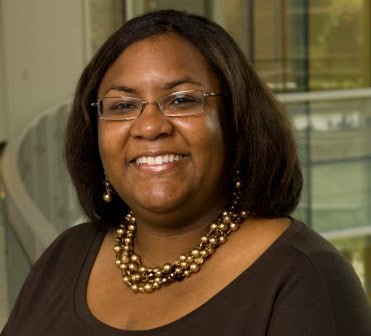 Dr. Monica F. Cox
Dr. Monica F. CoxSeveral publications and recent reports have highlighted the plight of Women of Color (WOC) in the academy, particularly WOC within science, technology, engineering, or mathematics (STEM) fields. In November 2013, the Institute for Women’s Policy Research published “Accelerating Change for Women Faculty of Color in STEM: Policy, Action, and Collaboration,” which reports that WOC represent only 5.7 percent (i.e., 6,400) of all STEM faculty at U.S. four-year colleges or universities, medical schools, and university-affiliated research institutes. With this initially low number, there are few to no reports or public databases presenting disaggregated data about STEM WOC faculty within specific disciplines such as engineering.
One of the major challenges WOC faculty face is being pioneers or trailblazers in their departments or universities, often involuntarily and without guidance about how to respond to numerous stakeholders who do not know how to approach and/or work with WOC. I experienced this firsthand when I began my academic career as an Assistant Professor in a male-dominated field at a predominantly White institution in 2005. I did not realize that, if successful, I would be the first African-American female to earn tenure in the College of Engineering. In my undergraduate and graduate programs, professors had mentored me on topics such as grant writing, journal article development, and leadership. I did not, however, engage in real-world conversations about the explicit challenges that I would face as a young African-American female engineering professor. (In all fairness, how does someone effectively mentor a person who embodies characteristics that don’t even seem to go together—i.e., young and Black and female and engineering and professor?)
You can imagine my shock when I gained “just-in-time” training from Day One. This included students calling me “Ms. Cox” when my male counterparts were automatically called “Professor” of “Dr.,” the recurring problem that people had distinguishing me from the only other Black female engineering faculty at the university, and the burden of feeling that I had no one to talk to about how these instances distracted me from focusing solely on the academic responsibilities expected of me as a professor. When each of these incidents occurred, I remember spending hours dwelling upon the injustices, the perceived disrespect, and the frustration.
After my husband (also an academic) told me that he felt that he was married to the people at my institution instead of me, and after I started being physically stressed by my job, I decided that something had to change. Normally an outspoken person, I had turned into a withdrawn person who I didn’t recognize anymore. After much reflection, I made a conscious decision to speak up about my concerns (while making sure that I was accomplishing my academic responsibilities with a sprit of excellence). I also shared my concerns with and received advice from numerous advocates, sponsors, and mentors on-campus and off-campus, including administrators and colleagues of all ages, gender, and ethnicities.
After much reflection, I have identified several lessons learned being a pioneering professor. They include the following:
- Know that you will meet faculty and students who have never met anyone like you. This means that you can think early about how to address startling comments or experiences. Will you ignore them, confront them (professionally, of course), or create a larger educational experience that addresses pertinent issues? Don’t let the impact of these comments keep you down.
- Rely on your networks outside your department or institution. There is no rule that says that you have to work solely with people at your institution. Know that if you were qualified to obtain a job at your institution, someone in the world would love to work with you. Although it may take a little longer to create your network, be persistent and don’t be discouraged.
- Identify your “bad day” buddies. This was some of the best advice offered to me by a senior colleague. You should not expose all of your “dirty laundry” to people at your institution who have the power to vote on your promotion and tenure decisions. Start journaling or talk to someone outside your institution about concerns that you have with leadership or colleagues.
- Work on yourself. Do not let the stresses of your academic job consume you. Develop new hobbies and realize that, if and when you leave your institution for whatever reason, you still need to be mentally, spiritually, emotionally, and physically healthy. You were a person of influence before you entered the academy, and you will be a person of influence when you leave.
In conclusion, as faculty of color in the academy, we have opportunities to speak to the masses about our real-life experiences and to educate people who have no idea how to address or collaborate with us. Remember that pioneers are visionaries who are often criticized and challenged as they travel on their journeys but are necessary to those who are destined to follow the paths that they have created.
Dr. Monica F. Cox is an associate professor of engineering education at Purdue University and a Class of 2008 Diverse “Emerging Scholar.”



















